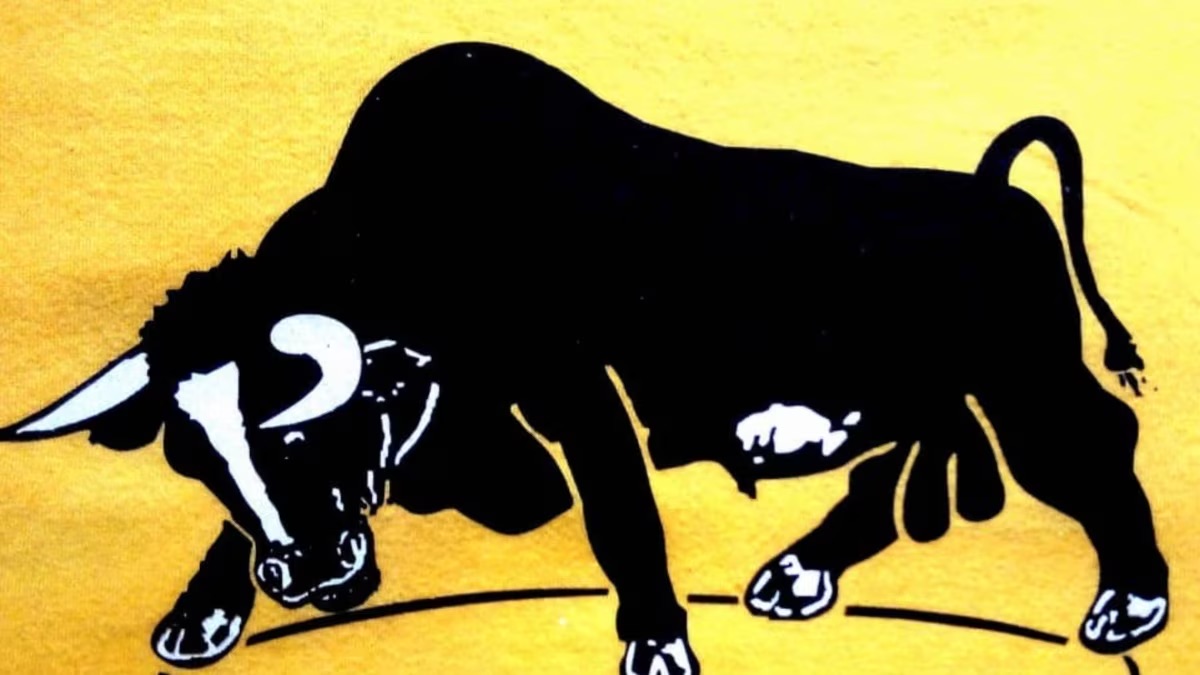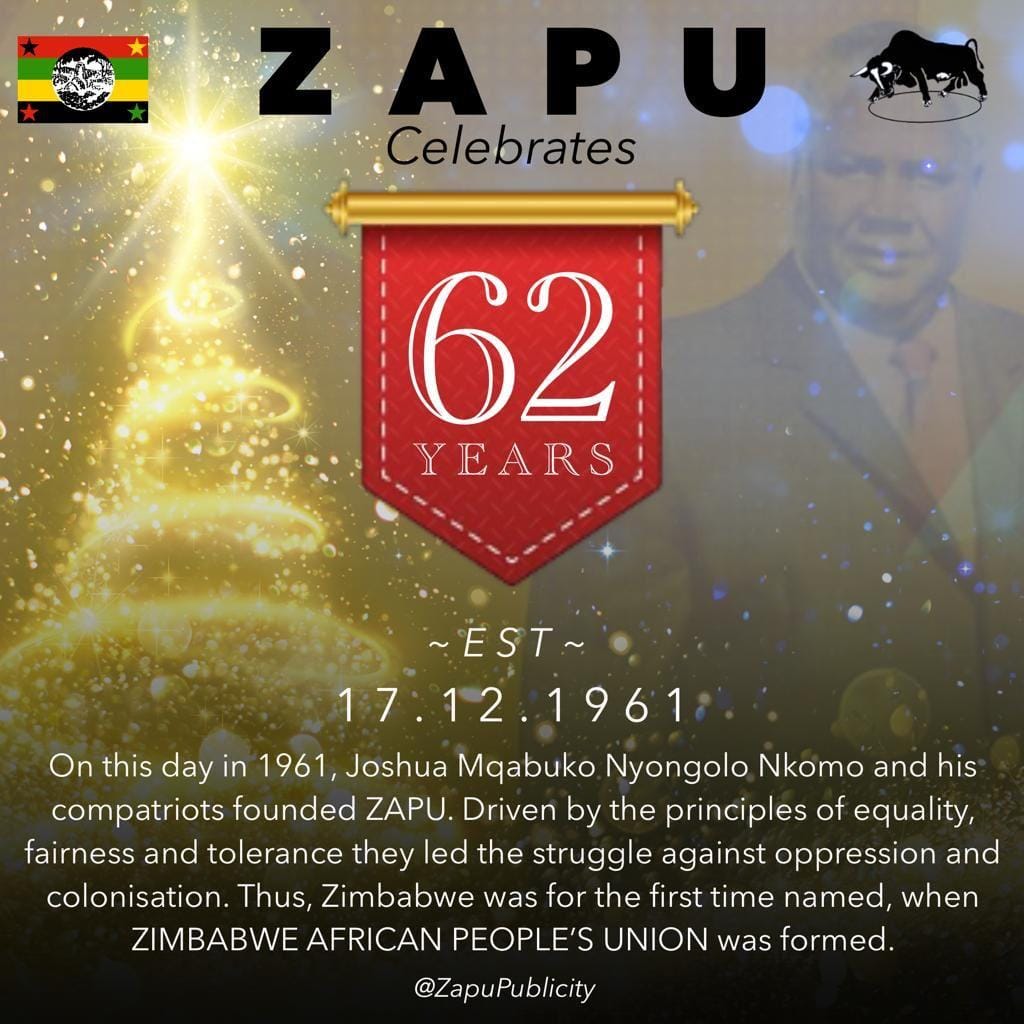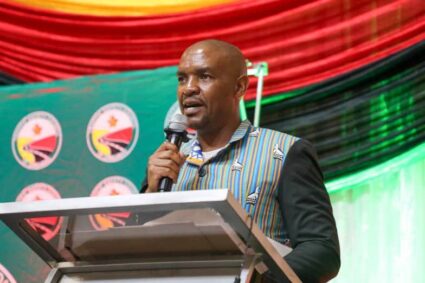
Sixty-two years after its fiery birth in the crucible of Zimbabwe’s liberation struggle, ZAPU, the nation’s oldest revolutionary party, finds itself at a crossroads. Born in the fires of revolution, Zimbabwe’s oldest liberation party, ZAPU, marked its 62nd anniversary on December 17th. Founded in 1961 by legendary figures like Joshua Nkomo and Robert Mugabe, ZAPU’s story is intertwined with the nation’s struggle for independence. From facing the Rhodesian regime’s ban to weathering internal challenges, the party’s journey has been one of resilience and evolution.
Emerging from the shadows of Rhodesian suppression, ZAPU’s armed wing, the Zimbabwe People’s Revolutionary Army (ZIPRA), rose under the leadership of the late General Lookout Masuku. Years later, in 2008, the party itself would rise again, relaunched by Joshua Nkomo’s son, Michael. Shortly thereafter, Dumiso Dabengwa, a decorated war veteran and former Minister of Home Affairs, assumed the presidency alongside Emilia Mukaratirwa as Vice-President.
My Afrika Magazine Current Affairs reporter had an exclusive conversation with the party’s spokesperson, Richard Gandari, who informed the media house that the country’s oldest revolutionary party has been playing a huge role in the lives of people of Zimbabwe both in urban and rural areas preaching and advocating for devolution.
“Thank you for your congratulatory message. ZAPU has actively served as a voice of reason at the local government level, particularly in the marginalized, rural areas of Zimbabwe. Notably, ZAPU cadres have lobbied for locals to be considered and prioritized for employment and economic opportunities, ahead of people from other regions. This has been ZAPU’s push in many rural areas across Zimbabwe. This stance is informed by ZAPU’s central theory of devolution of power and equitable distribution of economic opportunities,” said Gandari. He further added, that the party is encouraging Zimbabweans to be peaceful. “ZAPU has encouraged Zimbabwe’s restive populace to follow constitutional avenues for regime change and resist the temptation of resorting to anarchy and general rioting due to ZANU PF’s poor economic policies,” he said.
When asked to share more light on the achievements of ZAPU and what might be the reasons why the 62-year-old party is failing to obtain a seat in parliament.
Mr Gandari told this publication that the achievements that were made in the past by ZAPU cannot be erased in the minds of Zimbabweans. “Our 62 years of existence cannot be taken as a seamless, uninterrupted era. ZAPU was outlawed by the Rhodesian colonial regime for several years. It was actually during ZAPU’s ban that ZANU was formed in 1963. At Independence in 1980, ZAPU actually garnered a healthy number of Parliamentary seats but as early as 1983, Gukurahundi was unleashed on ZAPU members and ZPRA ex-combatants,” informed Gandari. He further lambasted those who have been castigating the leadership of their party President, Michael Sibangilizwe Nkomo. President Michael Sibangilizwe Nkomo has garnered respect and support within ZAPU. While some outside voices might suggest otherwise, Gandari emphasized that the party thrives on a leadership team with seasoned experience and youthful energy.

“Youth does not invariably guarantee wisdom. Joe Biden and Emmerson Mnangagwa are both 81 but leading or ruling their respective countries as executive presidents. In ZAPU our leadership is elected democratically during our elective Congresses, once every 5 years. Our last Congress was in October 2021. President Michael Sibangilizwe Nkomo was elected to lead by an overwhelming majority of ZAPU members. For him, it was a landslide victory and to this day he continues to serve with the full support of ZAPU members. Our National Executive Council is made up of men and women, young and old. Opportunities equitably exist for any member of ZAPU in good standing, to be elected procedurally by ZAPU members to lead in any capacity including the top job. It is not a preserve of any particular age group, gender or ethnicity,” he said.
Asked about ZAPU’s relationship with other opposition parties, Richard Gandari clarified their stance on ZANU PF and the CCC. He explained that after their withdrawal from the ZANU PF alliance, ZAPU remains open to cooperation with progressive forces aligned with their values. Regarding the CCC, he refrained from personal critiques, preferring to focus on the need for constructive dialogue and united efforts within the opposition movement.
“We were once in a Unity Accord with ZANU from December 22, 1987, to 2008 when we pulled out to revive our original ZAPU. ZANU got its PF suffix from our PF ZAPU. Our detachment from ZANU PF was a function of conscience and genuine patriotism. ZANU wanted to consolidate its grip on power and forge ahead with its pre-independence plans for establishing a one-party state in Zimbabwe. That plan is what we are still witnessing today with the Tshabangu strategy of decimating the CCC,” informed Gandari. He further added that ZAPU is a democratic, revolutionary party that believes in unity of purpose among progressive opposition parties.
“While multi-party democracy thrives on diversity, forming alliances shouldn’t be rushed. We prioritize internal consolidation and building strong relationships with other progressive forces. If future circumstances necessitate formal coalitions, we’ll prioritize dialogue and shared values to maximize their effectiveness. We are in no hurry to form any alliances unless certain compelling formations are proposed through dialogue during civil engagements and interactions with our opposition sister parties. Our considered position is also informed by the recent experiences of alliances such as the ill-fated MDC-Alliance. As ZAPU we are focusing more on putting our house in order and formulating strategies for mass mobilization. We are not even taking a festive break as we work on the internal issues needed to reload and relaunch. The raging bull is roaring back to life in full force,” he said.
Mr Gandari added, “In the next 62 years, ZAPU will prioritize infrastructure development, agricultural diversification, and access to quality education to propel Zimbabwe towards sustainable progress. Building upon Dr. Nkomo’s legacy, we aim to strengthen democratic institutions, protect human rights, and empower all citizens. Our vision is a Zimbabwe where rule of law prevails, exiles can return safely to contribute their skills, and our natural resources fuel economic growth and shared prosperity.”
Despite being the third largest party, ZAPU currently faces an uphill battle, holding no national parliamentary seats. Their recent council victory in Matabo offers a flicker of hope, but significant challenges remain in translating local success into broader electoral gains.


